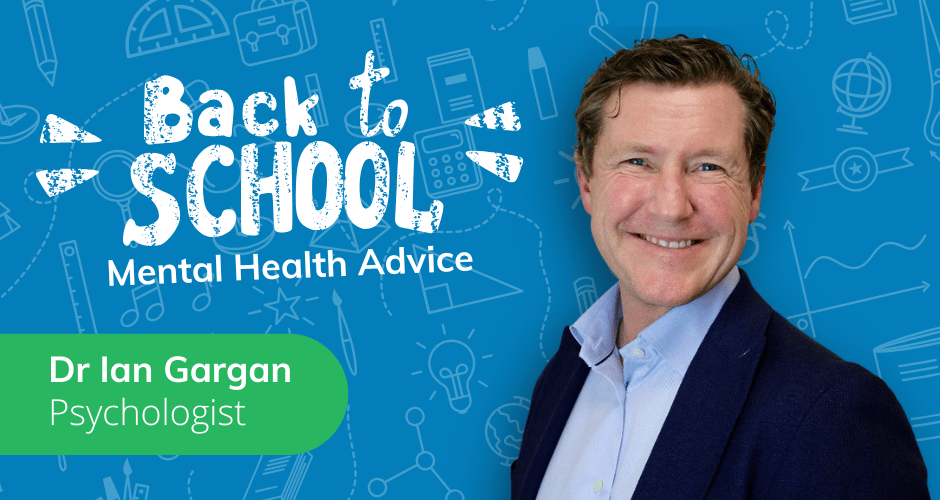Back to School Tips from a Psychologist

Naturally, some children struggle with anxiety in school and closures to school whether it is for circumstances like the summer holiday or unforeseen circumstances like a global pandemic provide a natural escape for students who have fears of going to school.
The introduction of teacher-assessed grades for 2 years also helped students with performance anxiety and gave them temporary relief from sitting in exams. However, this is the first full year that could be uninterrupted by the pandemic. (We know exams came back recently, but there was still some trepidation.)
This new round of academics is facing extreme challenges when it comes to getting ready to go back to school with everything they have faced in recent years, so we chatted with some renowned psychologists to help provide some tips to both students and parents to ease the transition back to school this autumn.
A few months ago, we sat down with Dr Ian Gargan, CEO of Imagine Health, a medical doctor and forensic psychologist to chat about how students can better prepare themselves at school to avoid anxiety and stress. This blog will expand further upon each video in that series as well as a few other tips exclusive to going back to school for the new academic year.
Empathy is a Parent's Best Friend (Sorry Dogs!)
We know as a parent, you want what is best for your child and that includes their academic success. It can be easy to get wrapped up in their homework and their grades and how they are going to achieve their future goals. But part of being a successful student is managing stress and anxiety.
So, one of the best things you can do for your child as they head back to school is to be empathetic towards them. Acknowledge that this is a big transition and that it might be scary for them.
Try to build a support system for your child by talking about their anxieties and how you can help them manage them. This will not only help your child feel supported, but it will also help you understand how best to help them.
It can be tempting to allow students to avoid situations that make them anxious as we look to protect them. Avoidance can often lead to an immediate reduction in stress levels; however, it results in detrimental long-term effects.
When children avoid triggers, they miss the opportunity to learn that they likely overestimated risk and underestimated their ability to cope. Slowly, over time, this avoidance can result in increased anxiety and the belief that the only way to experience relief is continued evasion.
This fall, anxious children and teens may resist leaving home in the morning, attending specific classes, or taking tests. In response, it will be critical to both express empathy with their feelings and set clear expectations that they approach their fears.
For example, if your child is resistant to separating in the morning, you might validate their difficulties (“I understand it is hard to go to school on your own now that you are used to being at home with me”) while maintaining firm expectations that they attend school (“and it is important that you are a part of your class today. I can’t wait to hear about your day when I see you later this evening.”)
Stress and Anxiety
What did Dr Ian have to say about stress and anxiety though?
"So you've got to remember that anxiety and stress are really normal, very important. Stress can actually be very productive once we know that there's a finite amount of time where we're going to complete something. Just if we went through stress forever, it would become counterproductive."
So harness the stress and use it to visualise what your success is going to be in the days and weeks ahead. And with that stress, know what stress can do to you. It can increase your breathing, increase your heart rate and make you feel uneasy.
So how do we deal with that? Well, we know how to get the heart rate and breathing down. So an exercise we can do is take three minutes away from the book and wait to study and carry a breathing exercise very slowly over three minutes, inhale through your nose and mouth and then just exhale through your mouth. Just don't look at the screen, close your screen, listen to music."
"You want to just focus on your body and how that feels, inhaling and exhaling for three minutes. Another exercise that you can engage with god progressive muscle relaxation, where you, again, leave the screen for about three to five minutes."
Set Realistic Expectations
This is a difficult time for everyone, so it is important to set realistic expectations for both yourself and your child. It is okay if things are not perfect and it is okay if your child is not getting straight A’s. This year, more than ever, it is important to focus on the process and not the outcome.
Encourage your child to do their best and to focus on their effort rather than the grades they receive. Help them to understand that everyone is struggling in different ways and that it is okay to not be perfect.
It is also important to manage your own expectations and anxiety around your child’s schooling. Remember, you are your child’s best advocate and they will look to you for guidance on how to manage their own stress and anxiety. If you are feeling overwhelmed, talk to your child’s teacher or school psychologist about ways you can support your child at home.
Routine, Routine and Yep, You Guessed it... ROUTINE!
Anxious children benefit from consistency and structure, especially during times of uncertainty. To support your child in feeling more secure and in control, implement a new daily routine in the weeks preceding the start of school.
Gradually set bed and wake times at earlier hours and ensure that your child starts their day by eating breakfast and addressing personal hygiene. Set a screen curfew at the start of the year to provide structure and ensure that your child can get a good night’s rest.
Transitions often create anxiety, even when they represent positive change. Just as your child adapted to learning from home at the start of the pandemic, they will eventually adjust to returning to the classroom. With your warm and firm support, this, too, shall pass.
Optimise Performance During School Hours
I asked Dr Ian, whether he had any exercises or tips that he can give students to help them improve their overall performance at school.
This was his response:
"So generally for mental resilience well-being, the most important pillars are socialisation, exercise, diet, sleep and cognition."
"One exercise would be to take a moment for three to five minutes, maybe three times a day, whereby they're actually practising some mindfulness using some apps like Headspace or Calm or talk therapy. Just take some time out so they can regroup and reboot their mind."
"Exercise is pivotal as well as good sleep. So with exercise, the British Journal of Medicine says that if you're able to carry out or participate in exercise for even 20 minutes a day, where your heart rate is just boosted by 20%, it's as effective as an antidepressant and it's actually a real boost to your performance."
"So even just leaving your desk and taking a walk for 20 minutes is really effective for your mental health and helps your mind to ready itself for further study."
"And sleep hygiene is very important. So getting ready for bed an hour, touching some work, doing something you enjoy, making sure that you change clothes maybe, or get cosy clothes, have a cosy sleep environment, and have a routine whereby you can optimise and have between six and 8 hours sleep a night, it's really important to be able to compound the learning you've done that day."
Some excellent tips in there to help you as you head back to school.
Open Communication Lines
Maintain open communication with your child’s teacher(s) throughout the year. This will ensure that you are aware of any changes in school policy or curriculum that may impact your child’s anxiety levels.
It is also important to let your child’s teacher know if they are struggling with anxiety or other mental health concerns. The sooner you reach out for help, the sooner your child can receive support and feel better.
There are many resources available to help children and families cope with anxiety. The National Association of School Psychologists provides a list of helpful school-based mental health supports on its website.
Parents
Students
Tutors
Looking for a tutor?
Sherpa has hundreds of qualified and experienced UK tutors who are ready to help you achieve your goals. Search through our tutors and arrange a free 20 minute introduction through our industry-leading online classroom.
Find a TutorSimilar Articles



